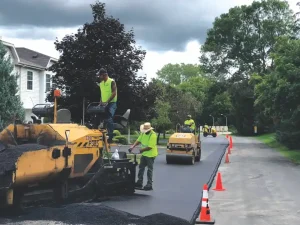Picture this: an inclement day with heavy rain pouring down, but rather than forming inconvenient and dangerous pools on the road, the water simply vanishes into the surface as if it were being swallowed by the Earth. That’s porous asphalt for you – a standout innovation that exemplifies how science and engineering can intersect to make our lives better. Let’s take a deep dive into the technology behind porous asphalt and how it is made.
What Is Porous Asphalt?
Porous asphalt is no ordinary road composition. It’s been designed ingeniously with minuscule openings or pores that uniquely allow rainwater to seep right through it. Unlike conventional roads where water may accumulate causing hazardous conditions, this advanced material functions more like a drain system, diverting water into the underlying soil instead of having it run-off along the surface. By cutting down on potential surface runoff, porous asphalt not only offers safer travel conditions during rainy weather, but it also assists in preventing disastrous floods. This technology paves the way for more sustainable and safer infrastructure fit for any climate condition.
How is Porous Asphalt Made?
The construction process of porous asphalt is a complicated procedure that necessitates meticulous planning, unwavering precision, and high-level expertise. It’s a method engineered to not only be structurally sound but also environmentally conscious. Unlike traditional pavement techniques, laying down porous asphalt is much more intricate because it requires the creation of a unique sub-base. This sub-base isn’t made from regular soil or gravel — instead, it’s filled with carefully selected stones. These stones are instrumental as they function as a reservoir system. They trap and store water that seeps through the micro-sized pores in the asphalt. However, the true brilliance of porous asphalt goes beyond its engineering features – it lies in its environmental footprint. Its innovative design encourages efficient water drainage and reduces runoff into surrounding areas. By cutting back on unnecessary water wastage and controlling erosion effectively, this material represents a truly sustainable paving option.
The Extensive Applications of Porous Asphalt
Porous asphalt is a revolutionary material that has seen increasing use in various applications. It is primarily used in pavements or parking lots due to its ability to allow water to pass through, reducing the risk of surface water build-up and flooding. Moreover, it’s extensively used in vegetation growth projects because its porosity creates an opportunity for groundwater replenishment. The pores provide a pathway for water to reach soil layers beneath the pavement, which consequently benefits vegetation. In colder regions, porous asphalt is indispensable in preventing dangerous icy conditions on pavements. Its property of allowing water to permeate helps reduce ice formation during winter. Overall, these diverse applications make porous asphalt beneficial across many sectors regarding environmental protections and safety concerns.
Contact the Experts at Pro-Pave for All Your Paving Needs
The experts at Pro-Pave are specially trained to provide the very best in quality paving for your home or business. Our process is efficient, ensuring that we minimize disruptions to your everyday life while ensuring the safety of those on or near the job site.
If you have a new paving project, don’t wait – contact our team at (703) 433-9500 or fill out our online contact us form to get a free quote or evaluation!





